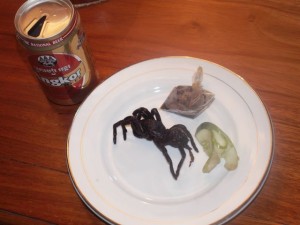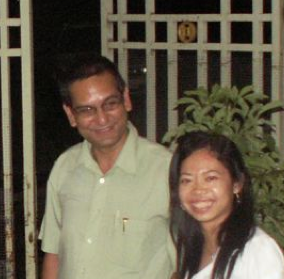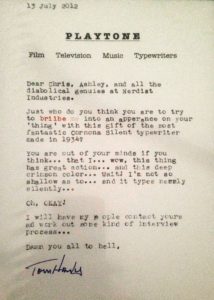This story illustrates the smug self-satisfaction of the seasoned traveler. I’ve included it because it has the power to make people squirm, simply because of its subject matter. When I’ve told this tale in public, grown adults have begged me to stop.
By Ken Burnett
It’s a great thing to visit the work and see for yourself. Stories just leap out at you, particularly in Africa, or anywhere in the developing world.
I was in Cambodia, with the charity ActionAid, on a private though semi-official visit as former chairman of the board. I was given some time off to see the country and, as I always do wherever I go, I was telling my hostess, a delightful young Cambodian woman called Boromey, that, of course, I have no dietary restrictions. Boromey was charged to take Marie and me out to lunch, and had asked out of simple politeness.
‘Oh me, I eat anything,’ I replied, with the smug self-assurance of someone who when in Rome, habitually does what the Romans do.
‘Would you like to try a Cambodian delicacy?’ she asked.
‘Of course’, I replied.
‘Ok she said. And I swear she smiled, sweetly but just a bit slyly.
The appetizers were brought, a rare Cambodian delicacy indeed. Three large, hairy tarantula spiders, deep fried but cold, accompanied by a small amount of bitter, quite revolting pepper sauce. I nearly fell off my chair. Boromey fixed me with a gimlet eye.
‘You did say…’

The beer can is strategically placed to give you an idea of the scale of this brute. Marie declined. I was firmly hoisted on my own wretched petard.

I thought the legs might be least revolting, because they looked crisp and not too hard to digest. This was a mistake. They were soft and chewy, pliable but covered in hairs and quite stringy. Not at all nice. And there were eight of them!
Then came the head. The abdomen had looked so bad I decided to leave it till last. But the head was about as revolting as I could take. Its soft skin was filled with a kind of puree, a pungent, sticky blackish-red paste. But it wasn’t some confectionary put in there by some chef with a twisted sense of macabre humour. It was whatever tarantula spider’s heads are habitually filled with, rendered into a horrid paste. It was execrable.
Then came the abdomen, the big body of the beast.
I was now sweating profusely and feeling squeamish indeed. But I gamely struggled on and ate the thing, to its last, obnoxious drop. The body was full of a greenish, more liquid fluid of very uncertain origins. Boromey was by now rolling between the tables with laughter.

Boromey and Keshav back at the office, looking very pleased with themselves.
OK, so I deserved it. But however long it takes, I will get even with Boromey, one of these days.
I’ll invite her to Scotland and offer her haggis. Only I’m sure she’ll like it.
Tripe and dripping, perhaps? Any ideas welcome.






